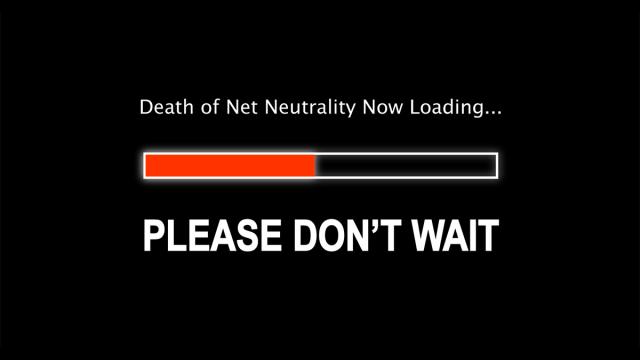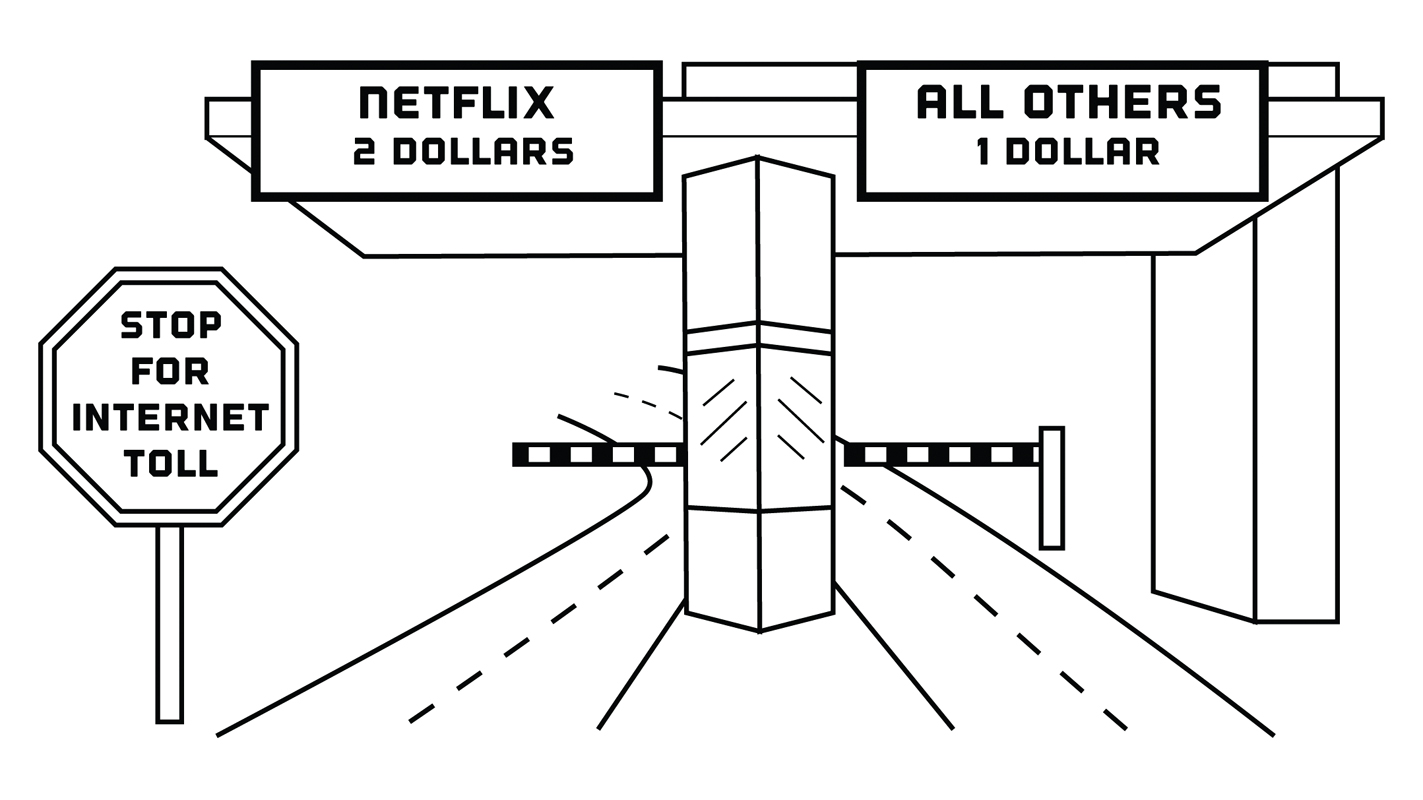
On Wednesday, the House and Senate Commerce Committees are discussing companion bills introduced by Sen. John Thune (R-S.D.) and Rep. Fred Upton (R-Mich.), which come in advance of an anticipated Net Neutrality ruling by the Federal Communications Commission that is expected to reclassify Internet access under Title II of the Communications Act.
But what the Congressmen are pushing is fake Net Neutrality legislation — dubbed "Title X" — and it's a loophole-ridden disaster. Go here to tell Congress that you oppose Title X and want to save net neutrality.
According to Matt Wood, a policy director at Free Press:
"If you want a few unregulated monopolies and duopolies to stifle competition and control the future of communications, these are the bills for you. But if you think that essential communications networks deserve basic protections, then these bills are a wreck.
"Both fail to even mention nondiscrimination, a glaring sign of Thune and Upton's intent. Despite what they claim, this legislation won't safeguard Net Neutrality. The bills instead would undermine the FCC's ability to protect Internet users by removing broadband and wireless companies from nearly all agency oversight.
"The legislation fails at the very thing it claims to accomplish. It prohibits a few open Internet violations but opens the door to new industry abuses. It claims to give the FCC limited adjudication powers but removes the agency's ability to adopt and adapt rules to fit the changing landscape for high-speed Internet access.
"What Thune and Upton are actually trying to do is declaw the one agency responsible for protecting the public interest in communications. Having lost their fight against Net Neutrality in the court of public opinion, companies like AT&T, Comcast and Verizon are trying to use fake Net Neutrality bills to end all effective oversight of their anti-competitive, anti-consumer practices.
"The solution is simple: The FCC should return to Title II, the applicable law that a bipartisan Congress wrote for all telecom networks, including broadband Internet access. That would restore the FCC's critical authority to prevent harmful discrimination, and also to promote competition, universal service and access, interconnection, public safety, and general consumer protections in an increasingly concentrated market that’s drifting dangerously toward monopoly.
"The FCC can adopt rules under Title II and forbear from those that aren’t needed to protect the public interest. Title II with forbearance will protect Net Neutrality while preserving the agency's flexibility to respond to the ever shifting cat-and-mouse games ISPs play to favor their own content.
“The American people, the president and businesses of all stripes have spoken up for real Open Internet rules. If the bills' sponsors really wish to honor their constituents' wishes, they should let the FCC do its job by using the existing law and the vital bipartisan principles in Title II."
Breaking Down the Legislation: Why the Bills Offer Inadequate Net Neutrality Protections
-
The bills legalize numerous harmful discriminatory practices while preventing the FCC from adopting and enforcing rules that respond to changing circumstances. While the legislation appears to prevent a few of the more harmful Net Neutrality violations, it also opens the door to various other ways to discriminate.
-
The legislation offers an extremely narrow approach to preserving Net Neutrality. While the bills may prohibit a few specifically defined harms, they do not allow any safeguards against forms of discrimination the legislation doesn’t describe (i.e., even if such other practices might constitute unreasonable discrimination, unjust or commercially unreasonable practices, harmful behavior, etc.).
-
The removal of the FCC's rulemaking authority handcuffs the agency while also limiting the public's ability to comment on the process. Under the legislation, the FCC can only adjudicate complaints alleging violations of these rigidly defined categories, and there's no timetable required for such adjudications.
-
Beyond the procedural limitations, the legislation may hamstring the FCC so that similar violations (e.g., different technical variations of throttling or prioritization practiced by different ISPs) may have to be separately adjudicated, an expensive and lengthy process.
-
Reasonable network management is just as loosely defined as it was in the 2010 rules definition, creating a potentially unbounded loophole — especially if the FCC is prevented from implementing rules or providing further guidance about what constitutes a "legitimate network-management purpose" under the legislation. Considering how narrow the prohibited harms listed in the bills are, almost any other network-management practice may need to be deemed reasonable and outside of the FCC's authority, no matter how discriminatory and harmful that practice may be.
-
Because the FCC can't even adjudicate beyond the "obligations" listed in the legislative provisions, this legislation could allow by implication all other practices omitted from the legislation, including:
-
ISPs' unpaid or vertical prioritization, allowing for prioritization of their own or their affiliates' content, so long as there's no specific payment for such treatment.
-
ISPs' throttling based on application used or some other factor may be expressly allowed, because the legislation only prohibits throttling based on the source, destination or content of Internet traffic. This could allow, for instance, throttling of any and all voice or video apps that compete with an ISP's legacy cable or voice services, or throttling of other applications so long as such throttling did not take the form of prohibited paid prioritization.
-
ISPs' discriminatory application of data caps, where an ISP could exempt its own content from such caps, or a third party could pay the ISP for such an exemption since no packets would be sped up or slowed down for payment or non-payment.
-
ISPs' continued argument that they may impose access charges and/or so-called "interconnection fees" simply for delivering traffic that the ISPs' own customers request, so long as the congestion allowed to occur at interconnection points does not constitute prioritizing or de-prioritizing packets over the last-mile network.
The Legislation Will Cause Collateral Damage to Broadband Competition and Service
-
The legislation effectively guts all the consumer protections and public-interest principles Congress adopted in an overwhelmingly bipartisan fashion in 1996 for existing and future two-way communication networks. Americans need competitive, universal, affordable, accessible and fully interconnected nondiscriminatory communications services. This legislation fails on all these fronts by stripping the FCC of authority to deal with such topics under Title II and even under the weaker and less-tested Section 706 framework.
-
The legislation would thus turn the public broadband network into a private one, allowing the Internet to be shaped by Comcast, Verizon and AT&T instead of by consumer and business demand, and the Internet innovation to meet this demand.
-
Classifying broadband Internet access as an information service could hamper the FCC's ability to promote competition and protect users of any broadband telecom service, and all telecommunications service beyond plain old telephone service. Indeed, the legislation mandates treatment of any service that offers "advanced telecommunications capability" as an information service. This one single amendment to the law could void the entirety of the Communications Act.
Why Title II Is the Correct Path Forward
-
The Internet exists today because of Title II. Researchers were able to use telecommunications services to connect computers together to form the Internet, without asking for the phone company's or the FCC's permission. This bill will kill any hope of a future, more open, more secure Internet, as it hands over control completely to the ISPs to determine the future of the Internet and all communications networks.
-
The existing law, written and passed on a bipartisan basis, gives the FCC the power to keep all two-way communications networks open and nondiscriminatory, as well as to ensure that essential services like broadband access are universally available, competitive, and affordable, and to make sure that consumers are protected from all possible harms. This new bill takes away the FCC's ability to uphold these values and to respond to changing markets and technologies.
-
Our nation's broadband problems go beyond just concerns about Net Neutrality. The FCC's restoration of the bipartisan Title II framework will not only preserve nondiscrimination and Net Neutrality, but also several other critical communications principles such as competition, universal service, interconnection and consumer protections.
If you haven't already, go here to tell Congress to oppose Title X and save Net Neutrality.
3 WAYS TO SHOW YOUR SUPPORT
- Log in to post comments


















